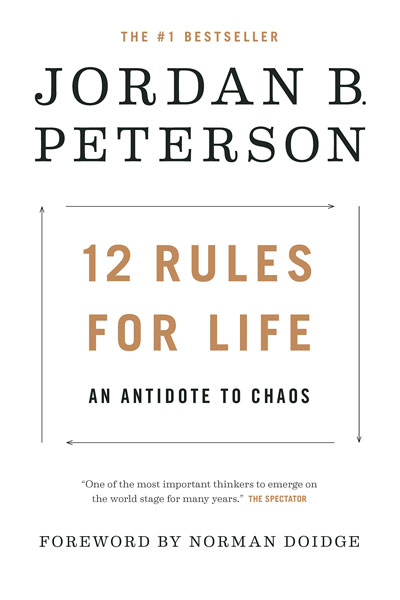

This article is an excerpt from the Shortform summary of "12 Rules for Life" by Jordan Peterson. Shortform has the world's best summaries of books you should be reading.
Like this article? Sign up for a free trial here .
In 12 Rules for Life, Rule #3 is “Make Friends With People Who Want The Best For You.” What does this mean? Why would you ever friends with people who don’t want the best for you?
Life isn’t that simple. Sometimes you attract friends who want to bring you down. Sometimes you find it hard to let go of friends you’ve had for a long time. Learn how to surround yourself with better friends who really care about you.
Overview of Jordan Peterson’s Rule 3
This rule is similar to the adage “you’re the average of your 5 best friends,” with more focus on why you might be hanging around people you know are bad for you.
Do you have a person you spend a lot of time with, who you feel is dragging you down, doesn’t support your personal growth, and whose goals don’t align well with yours? Consider why you still spend time with this person, knowing their presence isn’t good for you.
In 12 Rules for Life, Peterson gives three reasons you might still be with these people.
1) Sometimes, if you feel the person is “beneath you” in status, you may feel like you can rescue this person. But consider the other insidious, malevolent factors that could be at play:
- Why you stay with this person
- You have a savior complex – the idea of rescuing another person boosts your ego and makes you feel virtuous.
- The person’s lower status makes you feel better about your own. Someone whose marriage is falling apart makes you feel better about your own rocky one. Conversely, it’s intimidating for you to be around people who make you feel less accomplished.
- You want to exercise power over someone lower. Possibly because you feel that you are yourself exploited.
- The superficial motions of ineffective mentoring distract you from your own unwillingness to pursue a real, meaningful goal.
- You’re too weak-willed and indecisive to leave.
- Why the other person sticks around
- They benefit from/exploit your generosity, and when that runs out, they move on to another willing patron.
- They want to drag you down to their level.
- They may not realize they’re doing this, and want to believe their actions are genuine. This may be to put off the realization that they’ve given up and don’t care about improving.
According to Jordan Peterson’s Rule 3, while some people may really be capable of improving, some aren’t. People who don’t want to improve can’t be helped. It’s very difficult to overturn this foundational layer and convince someone to change for the better.
- Maybe they don’t believe they deserve to be helped, or they don’t go looking for it.
- They may want to repeat the horrors of their past, sometimes to feel as though they have agency over their suffering, sometimes because there is no alternative.
- They may want to continue feeling like a victim of life’s horrors, rather than taking personal responsibility for what’s under their control.
All of this is dramatized to the extreme, and Peterson recognizes that if the relationship is genuine and there is sincere desire to improve, then it’s still worth maintaining. But this is hard to accurately assess, so reflect and see if any of the above elements apply to your relationship. See if the person you’re helping accepts any personal responsibility – it’s a red flag if they merely see themselves as the victim of endless external causes.
Some Friend Groups Drag Each Other Down
2) This idea of a savior complex might not apply at all. Instead, you might all be bound by an implicit contract aimed at nihilism and failure. You’ve all decided to sacrifice the future for the present. Everyone deliberately wastes time, sets no goals, and sabotages themselves. No one mentions it, but everyone knows what the game is. If you feel that you’re ready to adopt a new attitude, then you need to move on from this group.
According to Jordan Peterson’s Rule 3, it’s much easier to fall into vice than virtue. Nihilism is easy – “nothing in the world matters, there’s no point to doing anything, so why bother?” It’s easier not to shoulder a burden, not to think, not to care. Pick one or two bad habits and indulge, and you can fall into a deep chasm, a personal hell.
A Single Bad Person Spoils the Bunch
3) Finally, even if everyone’s intentions are good, a negative person’s presence still drags you down. Studies show that pulling a problematic person into a team lowers the team’s overall efficacy – in essence, the team falls to the lowest common denominator.
- This might be because the high performers may feel resentment at others not carrying their weight, so they lower their performance to match.
According to Jordan Peterson’s Rule 3, even if the friendship isn’t a charity case, be wary of people who insidiously drag you down. They belittle your personal ambition because they’re embarrassed about lack of their own. They override your accomplishments with their own, real or imaginary.
Choose Friendships that Are Good for You
So how do you actually “Make Friends With People Who Want The Best For You?”
Surround yourself with people who support you and want to see you succeed. You will push each other to greater heights. Your goals will reinforce the others’, and each person’s life improves as the others’ improve. They won’t tolerate your cynicism and destructiveness, and they will punish you when you mistreat yourself.
“Friends” who are destructive will do the opposite. They’ll put down your goals. They’ll be jealous when you succeed, and try to knock down your achievements or one-up with their own. They worry that you’ll outshine them, so they pull you back down the abyss.
Avoid these friendships at all costs.
As you learned in Rule 2, have the friendships that you would advise other people to have. If you wouldn’t recommend your friendship with someone to your brother, or your parent – why would you have such a friend for yourself?
———End of Preview———

Like what you just read? Read the rest of the world's best summary of "12 Rules for Life" at Shortform . Learn the book's critical concepts in 20 minutes or less .
Here's what you'll find in our full 12 Rules for Life summary :
- Why standing up straight will make people treat you differently
- How to find meaning in your life and work
- Why you're lying to yourself without realizing it






